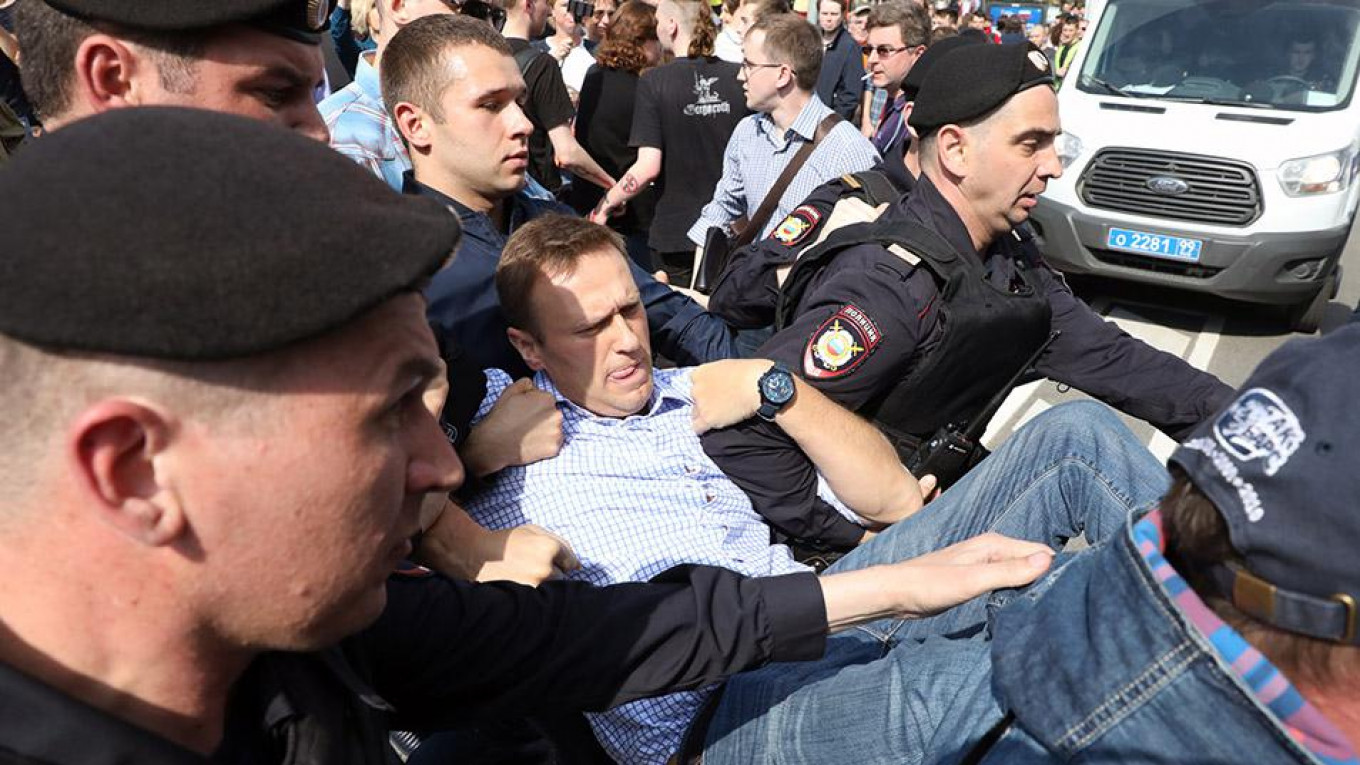Arrested youth
More than 1,500 mostly young Russians were arrested in two dozen cities during anti-government rallies on the eve of President Vladimir Putin’s inauguration, including protest organizer Alexei Navalny, a 12-year-old boy and a raccoon.
Moscow and St. Petersburg accounted for almost 1,000 of the arrests at the “He’s Not Our Tsar” protests on Saturday, where police at times used violence to disperse crowds.
Chief captive
Navalny later said he was released from custody, with a court hearing expected for May 11. He faces fines and jail time of up to 30 days for organizing an unsanctioned meeting and disobeying police.
“Apparently the order came down not to ‘jail me before the inauguration,’” Navalny tweeted.
Taxpayers’ whippings
The Tsarist-era Cossack warriors who were photographed beating protesters with infamous “nagaika” whips were found to have been financed by Moscow’s City Hall.
The mayor’s office reportedly paid the “Central Cossack Army” 15.9 million rubles ($254,000) in 2016-2018 for training to ensure public order and security at events including the FIFA World Cup next month.
Israeli visit
Israeli Prime Minister Benjamin Netanyahu has announced plans to visit Moscow on Wednesday for talks with Putin as Tel Aviv lobbies world powers to “fix or nix” a 2015 nuclear deal with Iran.
The Kremlin said that Netanyahu was invited to attend the May 9 Victory Day parade on Red Square, a year after only one foreign leader took part in the yearly military procession in Moscow.
Loko champs
Lokomotiv Moscow clinched their first Russian Premier League football championship title in 14 years with a 1-0 win against Zenit St. Petersburg on Saturday.
Portuguese forward Eder's goal in the last minutes clinched the title for Lokomotiv with one game to spare in the race, guaranteeing the Moscow club its third championship win since 2002 and 2004.
Morse defiance
A Russian state media regulator’s blacklist of websites has been reportedly altered to spell out a slogan against efforts to ban the Telegram messaging service.
The phrase “Digital Resistance” was written in Morse Code on the eve of Russia’s Communication Workers’ Day by unknown users, who manipulated blacklisted addresses to make them appear as lines and dots on a graph that tracks the list.
A Message from The Moscow Times:
Dear readers,
We are facing unprecedented challenges. Russia's Prosecutor General's Office has designated The Moscow Times as an "undesirable" organization, criminalizing our work and putting our staff at risk of prosecution. This follows our earlier unjust labeling as a "foreign agent."
These actions are direct attempts to silence independent journalism in Russia. The authorities claim our work "discredits the decisions of the Russian leadership." We see things differently: we strive to provide accurate, unbiased reporting on Russia.
We, the journalists of The Moscow Times, refuse to be silenced. But to continue our work, we need your help.
Your support, no matter how small, makes a world of difference. If you can, please support us monthly starting from just $2. It's quick to set up, and every contribution makes a significant impact.
By supporting The Moscow Times, you're defending open, independent journalism in the face of repression. Thank you for standing with us.
Remind me later.






